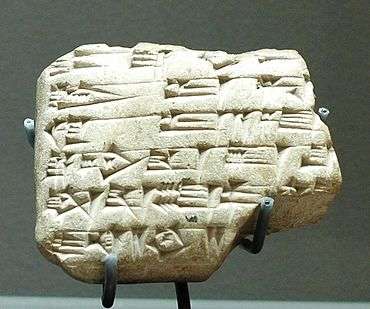Shibtu
| Mari |
 Euphrates • Terqa • Tuttul Royal Palace |
| Kings |
| Yaggid-Lim • Yahdun-Lim Yasmah-Adad Zimri-Lim (Queen Shibtu) |
| Archaeology |
| Investiture of Zimri-Lim Statue of Ebih-Il Statue of Iddi-Ilum |
Shibtu (reigned c. 1775 BC – c. 1761 BC) was the wife of Zimrilim and queen consort of the ancient city-state of Mari in modern-day Syria. Historian Abraham Malamat described her as "the most prominent of the Mari ladies."[1]
Life
Shibtu was born to the royal family of the kingdom of Yamhad. Her parents were Yarim-Lim I, king of Yamhad, and Gashera, his queen consort.[2] Zimrilim was forced to flee Mari when his father the king, Iakhdunlim, was assassinated in a palace coup and Yasmah-Adad usurped the throne. Zimrilim allied himself with Yarimlim of Yamhad who helped him regain his throne in Mari and their alliance was cemented with the marriage of Zimrilim to Shibtu.[3] Zimrilim and Shibtu's offspring included at least seven daughters. Several of their daughters went on to marry into other royal families from the ancient Near East, including Ibbatum, who married Himidiya, the king of Andarik, and Inib-Sharri who married Ibal-Addu, ruler of Ashlakka.[2]
Queen of Mari
I have asked my questions about Babylon. That man is plotting many things against this country, but he will not succeed. My Lord will see what the god will do to him. You will capture and overpower him. His days are numbered and he will not live long. My Lord should know!
—Shibtu's letter to Zimrilim on the prophecy concerning Hammurabi[4]
Shibtu enjoyed extensive administrative powers as queen. During Zimrilim's absence, Shibtu handled the administration of the city, the royal palace and the temple. The tablets found at Mari reveal regular correspondence between Shibtu and her husband in his absence. The letters were mostly administrative in nature, including reports on the state of the city and military and intelligence briefings.[5] Personal letters were also exchanged, including one notifying the king of her giving birth to a boy and girl twins.[2] Shibtu's letters reflected deep affection for her husband and concern over his health and wellbeing during his campaigns. Zimrilim, likewise, sent letters back updating her on his battles and whereabouts, and instructing her on the running of the city.[6] In one of her letters, Shibtu informs Zimrilim, upon his request, on the oracle's prophecy that the Babylonian attack against Mari would end in failure. The prophecy, however, was wrong and the Babylonians under Hammurabi sacked Mari in 1761 BC.[4]
References
Citations
Bibliography
- Malamat, Abraham (1989). Mari and the Early Israelite Experience. Oxford University Press. ISBN 0-19-726117-5.
- Dalley, Stephanie (2002). Mari and Karana: Two Old Babylonian Cities. Gorgias Press LLC. ISBN 9781931956024.
- Hamblin, William J. (2002). Warfare in Ancient Near East. Taylor & Francis. ISBN 9780415255882.
- Van de Mieroop, Marc (2008). King Hammurabi of Babylon: A Biography. John Wiley & Sons. ISBN 9780470695340.
- Tetlow, Elisabeth Meier (2004). Women, Crime and Punishment in Ancient Law and Society: Volume 1: The Ancient Near East. Continuum International Publishing Group. ISBN 9780826416285.